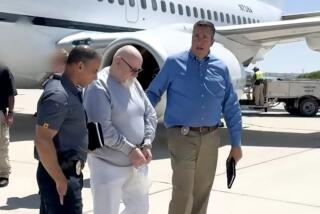Officials See 6 Slayings as Deliberate Acts
- Share via
SACRAMENTO — The portrait of a deliberate, calculating killer emerged Wednesday as authorities continued the search for a 27-year-old man suspected in the murders of half a dozen family members, including his wife and son.
Investigators believe that suspect Nikolay Soltys switched cars after a murderous rampage Monday, had his second vehicle repaired and left behind a grisly manifest of victims offering the first hints of a motive: He was angered by how some of his relatives spoke to him.
Detectives say the Ukrainian immigrant, who reportedly has a history of mental instability and domestic violence, later apparently lured his 3-year-old son into a large cardboard box by putting several small toys in the carton. Investigators on Tuesday discovered the boy’s stabbed and bloody body slumped over the trinkets.
“We’re coming to find more and more how coldblooded a killer this guy was,” said Sacramento County Sheriff Lou Blanas at a news conference Wednesday.
Investigators released a family photograph, discovered in Soltys’ abandoned Nissan Altima, bearing a taunting message on the back referring to his wife and other relatives. A photo released Tuesday bore instructions on where to find the body of Soltys’ son.
Experts said the evidence released so far suggests that the killer was someone who felt slighted. “When we see a family massacre, it’s almost always a male who is feeling very much a victim himself,” said Mike Rustigan, a San Francisco State criminology professor. “He feels wronged, shafted, that life is dealing him bad cards.”
A witness told investigators that he saw Soltys Monday night in an emerald green and silver Ford Explorer. The thin, soft-spoken murder suspect could be headed just about anywhere in the U.S., authorities said.
Russian and Ukrainian immigrant enclaves around the country were on alert, authorities said, particularly communities where Soltys has relatives, in New York, North Carolina and Seattle. Soltys’ surviving family members in Sacramento County have been put up in a hotel under the protection of armed sheriff’s deputies, law enforcement officials said.
Blanas said a reward fund has now topped $30,000 for information leading to an arrest. The FBI joined the case Tuesday night, providing Russian-speaking agents and securing a federal arrest warrant based on the possibility that Soltys has fled California.
A weary Det. Ron Garverick, the Sacramento County sheriff’s lead investigator on the case, said it remains unclear whether Soltys got help from someone, even an unwitting benefactor. Investigators so far cannot determine whether the mid-1990s sport utility vehicle that Soltys is believed to be driving was stolen, borrowed or purchased by the unemployed emigre, who reportedly has been plagued by financial difficulties.
Monday morning’s rampage began with the fatal stabbing of Soltys’ pregnant 22-year-old wife, Lyubov, in their duplex. Soltys was seen fleeing the home, in a cul-de-sac in North Highlands, a Sacramento suburb, in his silver Nissan.
Soltys is suspected of striking an hour later in the Rancho Cordova neighborhood where most of his extended family lived. Authorities said the assailant arrived calmly, but then killed an aunt and uncle, Petr Kukharskiy, 75, and Galina Kukharskaya, 72, as well as two young relatives, Tatyana Kukharskaya and Dimitriy Kukharskiy, both 9.
Soltys then went to his mother’s home in Citrus Heights, another suburb, where he calmly picked up his young son, Sergey, detectives say.
The mother was caring for the boy because Soltys was supposed to start classes at a community college and his wife was to begin a job at a market.
On Wednesday morning, investigators learned that a Citrus Heights mechanic familiar with the Ukrainian immigrant worked on the Ford Explorer’s luggage rack about 8 p.m. Monday.
The mechanic told detectives that Soltys was accompanied by his son.
At 10:30 p.m., investigators discovered Soltys’ Nissan abandoned behind a home improvement store half a mile away. Inside were two pictures with messages scrawled in Ukrainian on the back.
The first, on a picture of Soltys’ wife holding his son as an infant, led detectives to a rural stretch of road just beyond the county’s northern boundary.
In a trash-filled field, they found the dead boy, originally said to have been bludgeoned, in a 3-foot-wide box.
The inside was covered with blood, Garverick said, and the child may have been molested.
Detectives found tire tracks and two sets of shoe prints--an adult’s and a child’s--leading to the box. Only the set of adult prints returned to where the car appeared to have been parked.
A second picture found in the Nissan showed Soltys carrying his wife in his arms.
On the back were listed the names of his dead wife, a cousin and another cousin’s wife. The message suggested that each had wronged him with his or her “tongue,” investigators said. The cousin is the father of the slain boy, Dimitriy. The other cousin’s wife is the mother of Tatyana.
“I don’t want to say it was a hit list per se,” Garverick said, but he said the note suggested that “there was some planning involved” and that the murderer was “pretty coherent in his thoughts afterward.”
Friends and relatives expressed shock Wednesday, as they have for days, at the crime.
In New York, where his family first settled in the U.S. and where Soltys lived for two years, “he was normal,,” said Lorelle Frushour at the InterReligious Council of Central New York, which helps refugees.
Miroslava Boyko, 59, a Ukrainian refugee and former friend of the family, said, “His parents were good people. We just can’t imagine what happened.”
But experts in criminal psychology said Soltys fit the pattern of someone primed for a family massacre.
Officials said he had been rejected by the Army in the former Soviet Union, deemed mentally unfit. Soltys’ first marriage ended because of domestic violence. His second wife, Lyubov, delayed joining him in the U.S. because of concerns over his violent behavior toward her. Soltys had a spotty employment record.
Los Angeles County Sheriff’s Det. Paul Delhauer, who develops criminal profiles, said most cases of family violence involve an assailant feeling failure and hopelessness.
The killer is “acting out and taking out his anger on people who might be complaining about his failure and are most directly affected by his sense of failure,” Delhauer speculated.
“This mass murder was not out of the blue,” agreed Rustigan.
Reid Meloy, a forensic psychologist at UC San Diego, said that in most mass murders, a major mental disorder is involved. Even so, he said, “these are not acts where an individual loses control and acts impulsively. There’s usually evidence of some kind of planning or deliberation.”
Often, the suspect ends up committing suicide. “His flight,” Meloy said, “is unusual.”
In the North Highlands cul-de-sac, neighbors said Soltys seemed especially controlling, and would not even let Lyubov attend weekly prayer gatherings held by the women in the neighborhood.
Lyubov Soltys, however, planned to start work at a new job the day of the slayings. Rustigan said that could have helped trigger a rampage.
*
Times staff writers Miles Corwin in Los Angeles and John J. Goldman in New York contributed to this story.
More to Read
Sign up for Essential California
The most important California stories and recommendations in your inbox every morning.
You may occasionally receive promotional content from the Los Angeles Times.













